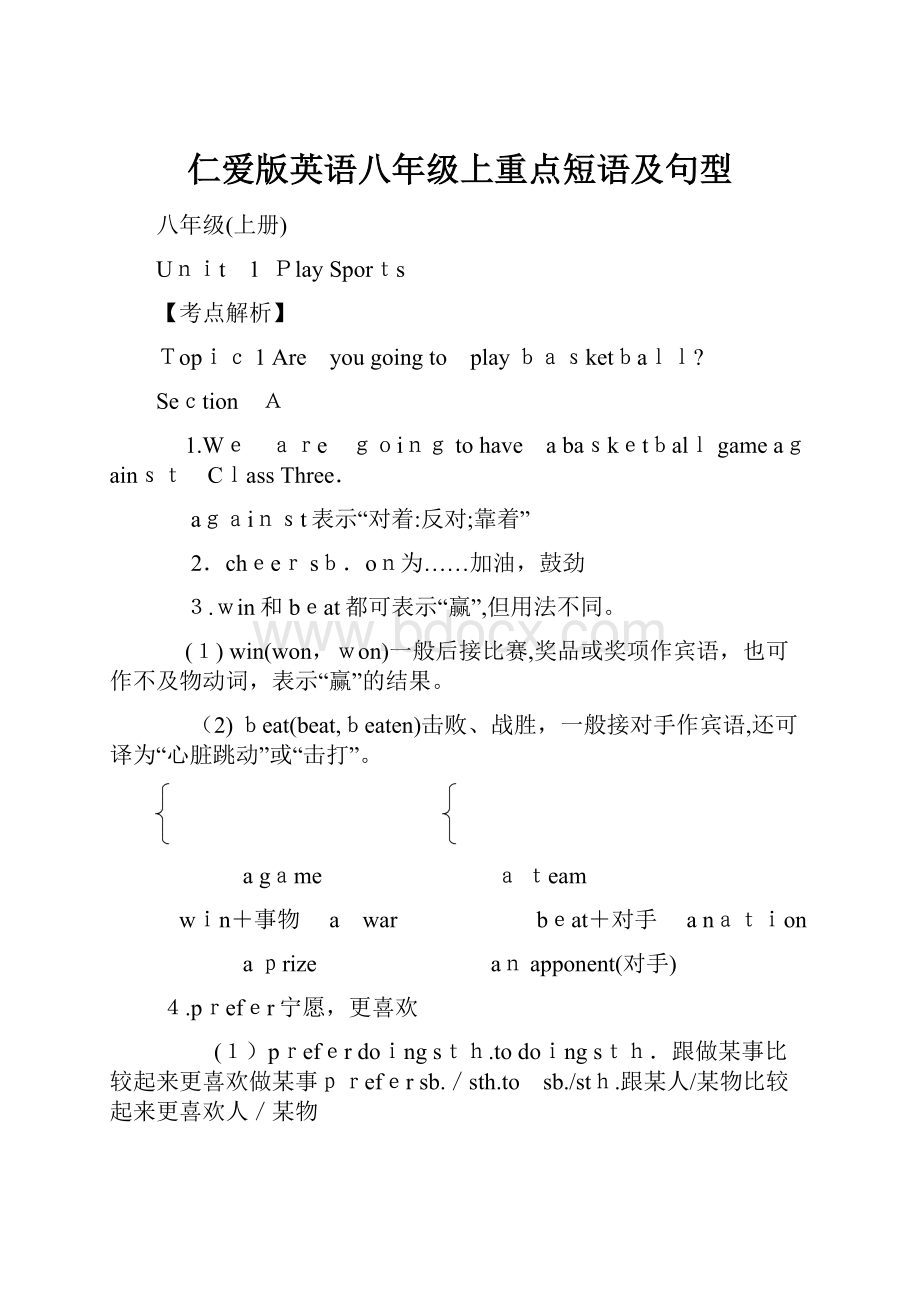仁爱版英语八年级上重点短语及句型.docx
《仁爱版英语八年级上重点短语及句型.docx》由会员分享,可在线阅读,更多相关《仁爱版英语八年级上重点短语及句型.docx(113页珍藏版)》请在冰豆网上搜索。

仁爱版英语八年级上重点短语及句型
八年级(上册)
Unit 1PlaySports
【考点解析】
Topic1Are yougoingto playbasketball?
Section A
1.We are goingtohave abasketballgameagainst ClassThree.
against表示“对着:
反对;靠着”
2.cheersb.on为……加油,鼓劲
3.win和beat都可表示“赢”,但用法不同。
(1)win(won,won)一般后接比赛,奖品或奖项作宾语,也可作不及物动词,表示“赢”的结果。
(2)beat(beat,beaten)击败、战胜,一般接对手作宾语,还可译为“心脏跳动”或“击打”。
agame ateam
win+事物 a war beat+对手 anation
aprize anapponent(对手)
4.prefer宁愿,更喜欢
(1)preferdoingsth.todoingsth.跟做某事比较起来更喜欢做某事prefersb./sth.to sb./sth.跟某人/某物比较起来更喜欢人/某物
(2)prefertodo sth.(rather)thando sth.跟做某事比较起来更喜欢做某事
(3)prefer todosth.更喜欢做某事
5.join/takepart in
(1)join参加某个政党,团体,组织等,成为其中的一员
(2)joinsb.(indoingsth.)和某人一起(做某事)
(3)joinin=takepart,in参加某项活动
SectionB
1.play forateam为某队效力be in/onthe team在某队打球
2.dream作名词,“梦,梦想”。
e.g.mydreamjob也可作动词dream of/aboutsth./doingsth.
3.“oneofthe+形容词最高级+名词的复数”意思是“最……之一”。
4.breaktherecord打破记录
5.inthe 2008Beijing Olympics在2008年北京奥运会中。
“在……比赛中”用in
e.g.inthe race/inthebasketballgame
6.giveup放弃。
注意应该把介词放在中间。
e.g.giveitup,giveupdoingsth.放弃做某事。
7.Whata Shame=Whatapity真遗憾!
SectionC
1.spend/cost/pay/take
(1)spend作“花费”之意时,指花费时间/精力/财力在某事或某物上,主语是人。
(2)cost主要指花费金钱/时间/劳力/精力等。
主语是某物或某事。
其结构是sth.costs sb….
(3)paysb,酬谢某人,pay…for…可等同于spend…on…,或用cost作同义句转换。
(4)take一般指花费时间,其主语是名词或动名词,经常用it作形式主语。
2.do exercise=playsports做运动,锻炼
3.Therebe句型的将来时结构为Thereis/aregoing tobe或Therewill be。
注意在Therebe句型中不能出现表示“有”的have和has。
4.the highjump跳高 thelong jump跳远
5.Sure
(1)be sure that+从句e.g.Iamsurethatheisright.
(2)sb.besuretodo sth.某人一定会做某事。
强调说话人的语气。
(3)besure of/aboutsth./doingsth.“确信”,表示主语对……有把握。
(4)用在祈使句里Besure(not)to dosth.一定(不)做某事 e.g.Besuretocomehereearly.
6.make的用法。
(1)makesb.dosth.使某人做某事。
被动语态中要还原to。
(2)“makesb./sth.+形容词”使某人或某物处于某种状态。
(3)makesth.forsb.—makesb.sth.为某人制作……
7.begoodfor“对……有益”,反义词组是be badfor“对……有害”。
8.keephealthy=keep fit保持健康
SectionD
1.playagainst跟……进行比赛
playwith/playagainst/playfor play with玩耍,游戏,玩乐,与……玩耍。
playagainst同……比赛。
playfor为……效力。
2.leave…for…离开某地去某地leave for=setoff for出发去某地.
3.一般将来时
(1)含义:
表示将来某个时间要发生的动作或是存在的状态,也表示将来经常或反复发生的动作,常与表示将来的时间状语连用,如:
tomorrow,soon,lateron,nexttime(week,month,year,Sunday…)等。
(2)结构为begoingto dosth.或willdosth.。
Therebe句型的将来时结构为Thereis/aregoing tobe或There willbe。
注意在Therebe句型中不能出现表示“有”的have/has。
(3)表示位置移动的动词go,come,leave,fly,start等可以用现在进行时表示将要发生的事。
其中go和come一定要用现在进行时表示将来。
【例19】(10年河北中考)Thisterm________over.Thesummer vacation iscoming in twoweeks.
A.is B.was C.hasbeenD.will be
【例20】(10年重庆中考)Ifyou___________ tothe2010ShanghaiExpo nextweek,I willgowithyou.
A.go B.hasgone C.willgoD.aregoing
【考点解析】
Topic2Wouldyou mindpassingmesomewater?
SectionA
1.would/could/willyou(please)dosth.“请你做……好吗?
”表示委婉请求对方做某事,否定结构是would/could/will you(please)not dosth.。
e.g.Would you pleasenot playthe pianoloudly?
2.fallill“生病”,be ill“生病的”,强调一种状态。
feelill“感觉不舒服”,强调一种身体感受。
falldown摔倒,跌倒。
3.mind的用法
(1)作动词,表示“介意”,常用于疑问句或否定句中。
其结构是mindsb./sth./doingsth.
对would youmind sb./sb.'s doingsth.及“wouldyoumindif+从句”的回答,如果是表达“会介意”,可用Yes,you'dbetter not./IamsorrybutI do.如果表达“不会介意”,可用No,notatall./Nevermind./Itdoesn'tmatter./No,of course not.
(2)用于提出建议。
Wouldyou mind doingsth./wouldyou mindnotdoingsth?
对Wouldyouminddoingsth.的回答可以用Of coursenot,Iwilldo itright away./Sorry.I willdo itrightaway.对wouldyoumindnotdoingsth.的回答可以用Sorry,Iwon'tdo itagain./I'msorryaboutthat.
(4)作名词,“思想”。
setone'smindtodosth./onsth.专注于做某事
4.beglad/happyto dosth.乐意做某事
5.practicesth./doingsth.练习做某事
SectionB
1.bealwaysdoingsth.老是……,含有抱怨的感情色彩。
2.careless形容词,反义词是careful。
carelessly副词,反义词是carefully.
3.chance机会haveachancetodosth.有机会做某事getachancetodosth.得到一个机会做某事
4.Whatdo youmeanby sth./doingsth.?
=What'sthemeaningofsth./doingsth.?
5.shoutatsb.朝某人喊叫,含有生气或气愤的感情。
shout tosb.朝某人喊叫,只是为了使对方听到,没有感情色彩。
6.fightwithsb.=haveafight withsb.与某人打架
7.beangrywithsb.意为“生某人的气”,如:
【链接】
(1)beangry at对某人的言行感到气愤,
(2)be angryaboutsth.对某事感到生气,如:
8.doone'sbesttodosth.=tryto dosth.尽力做某事
9.saysorry/hello/goodbye to sb.向某人道歉/问候,/道
10.be/feelsorryfor/todo为……而抱歉(难过)
11.keep的用法
(1)keepsb.doingsth.使某人一直做某事
(2)“keepsb./sth.+宾补+adj.”使某人/某物处于某种状态
(3)“keep sb./sth.+宾补+adv.”使某人/某物处于某种状态 (4)keepdoing sth.继续不断做某事e. (5)“keep+表语”,表示保持/继续(处于某种状态) e.g.keep fit/healthy
(6)赡养e.g.My fatherkeepsabigfamily.
(7)保存,保留e.g.HowlongcanIkeepthebook?
12.turndown调低音量turn up调高音量turnon打开turnoff关上 注意代词都要放在中间。
【分析比较】turn on“打开(水龙头、电视、收音机、灯、煤气等)” turnoff“关掉(水龙头、电视、收音机、灯、煤气等)”。
turnup“开大,调高”。
turndown“减少,关小”
13.inaminute/right away/atonce立刻,马上
14.对sorry的回答可以是That'sOK(all right)./Itdoesn'tmatter./Nevermind./Notatall
SectionC
1.lovedoing/to dosth.喜欢做某事
2.exciting/excited exciting指使人感到兴奋的事excited是指人对……感到兴奋
3.as well/too/also/either/so/neither
(1)too/aswell表示“也”,一般放在句末,且前用逗号隔开,常用于肯定句。
e.g.Tomis astudent;Jackisastudent,too/aswell.
(2)also表示“也”,用于肯定句中,放在be动词、助动词、情态动词后实意动词前。
(3)在否定句中,都要改为either。
(4)so表示“也”时,用在倒装句中,表示肯定,其结构是“so+be动词/助动词/情态动词+主语”。
e.g.Katewentshoppingyesterday;Tom wentshopping,too/aswell(sodidTom).
(5)neither表示“也”时,用在倒装句中,表示否定,其结构是“neither+be动词/助动词/情态动词+主语”。
e.g。
Kate didn'tgoshoppingyesterday;Tom didn'tgo shopping,either(NeitherdidTom).
4.sothat引导目的状语从句,含义是“以便,目的是,为了”。
从句的谓语动词要用may,can,should,could等情态动词,表示目的状语,相当于inorderthat,可以改成inordertodo句型。
e.g.Let'stake thefrontseatssothat/inorderthatwemayseemoreclearly.=Let's takethefront seatsinordertoseemoreclearly.
6.other/others/another/theother/theothers
other作形容词,指“其他的,别的”。
e.g.otherstudents
others
(1)别人e.g.Youmustbe politeto others.(2)“其他的人或物”,指在一个范围之内,除去一部分后剩余的部分,而不是全部,一般出现短语some…others中。
e.g.Therearemanystudents intheclassroom,somearereading,somearewriting,others aretalking.
another
(1)(三者或三者以上)“又一个,再一个”。
不确定数量中的另外一个。
Jack has boughtanotherpen.
(2)别的,不同的。
I don't like thisshirt.Pleaseshow meanother one.(3)another+数词+名词一数词+more+名词。
“再多一些”,在原来的基础上再加一些。
one…theother两者之间一个……另一个……
SectionD
1.连接时间的介词用法(1)ago“多久之前”,用过去式。
结构是“段时间+ago”e.g.twodaysago
(2)“before+点时间”,表示“在几点前”,可用过去时、将来时或一般现在时。
e.g.Theywill beherebefore7:
00。
(3)“in+段时间”,指“多久之后”,用将来时。
e.g.WewillgettoBeijing in threedays.(4)“after+点时问”,在几点之后,可用过去时,将来时或一般现在时。
e.g.Weoftenplay footballafter5:
00intheafternoon.“after+段时间”,表示“多久之后”,只能用于过去式。
e.g.Hecame back after fourdays.
2.instead副词,“代替。
而。
相反”,单独使用时放句末。
insteadofsth./doingsth.取代/而不是……
3.buildsb.up使某人更强壮4.havefundoingsth.做某事很愉快
(1)have fun= enjoyoneself=have agoodtime玩得开心,过得快乐
(2)have funwithab.与某人共度快乐时光
(3)Havefun/Enjoyyourself/Haveagoodtime等可以作为对别人出行前得祝福。
Topic3Whichsportwill you takepartin?
SectionA
1.thesportsmeet/meeting运动会theboys'800一meter race男子800米赛跑thelongjump跳远thehighjump跳高therelayrace接力赛跑
2.It'sthe/one'sfirst/second/…timetodosth.
3.makefriends withsb.与某人交朋友。
注意friends要用复数形式。
4.bereadyfor sth.为某事而准备。
5.maybe/may be maybe=perhaps副词,“也许,大概”。
e.g.Maybeheisatthebusstation now.maybe是情态动词may后接动词原形be,
SectionB
l.打电话问对方是某人时,可以问Isthat…(speaking)?
回答可以是Yes,who'sthat?
/Speaking.
问对方是谁时用Whois that?
告诉对方自己是谁时,应该说This is…(speaking)。
找人接电话时,应该说Hello,mayIspeakto sb.?
回答时如果是本人接的电话,可以直接说speaking。
2.Let's make ithalf pastsix.让我们定在六点半吧。
makeit
(1)指约定时间e.g.Let's make itat6:
30.
(2)办成,做到(打算或希望做的事)
3.pass动词,“传递”。
passsb.sth.=passsth.tosb.把某物传给某人。
e.g.Wouldyoupleasepassmethebook?
“经过”。
e.g.Shewasthe firstone topassthefinishing line.pass by…“经过(某地)”。
past可作副词或介词,“在……旁经过”。
e.g.He hurried pastme withoutstoppingtotalk with me.
【例6】(09年新疆中考)—Didyouseetheaccidentyesterday?
—Yes.Ithappenedwhen I themuseum.
A.walkedpass B.waswalkingpastC.walkpastD.waswalkingpass
【例7】Weneed _______________________(再加两个人)todothework.
4.congratulations.祝贺你。
当别人取得成绩、荣誉时,我们可以对他说:
Congratulations!
【例8】(10年广东中考)—Yesterday 1wonthefirst placeinthe 100-meterrace.
—Really?
________!
A.Congratulations B.Nevermind C.That'sall right D.I'm sorryto hear that
5.takephotos/pictures照相e.g.Look,lotsofstudentsaretakingphotosofthebeautifulflowers.
【例9】(10年兰州中考)—what areon showin themuseum?
—Somephotos________bythechildrenofYushu,Qinghai.
A.havebeentakenB.weretaken C.aretaken D.taken
SectionC
1.hold/haveasportsmeet举行运动会
2.be goodatsth/doingsth.=do wellin sth/doingsth.擅长(做)某事
dobadly insth./doing sth.在某方面做得糟糕
【例10】His fatheris goodatmakingmodelplanes.(同义句改写)
His father___________________ _________modelplanes.
3.encouragesb.to do sth.鼓励某人做某事。
【例11】 My fatheroften encouragesme________(study)hard.
4.takeexercise=dosports做运动。
其中exercise是不可数名词,意思是“运动,锻炼”。
它也可以做可数名词,意思是“练习,体操”。
e.g.domorning exercises做早操
【例12】(10年陕西中考)—whatdo youthink of the________?
—Ithink they aregood forour eyes.We shoulddothemoften.
A.eyesexerciseB.eyeexerciseC.eye exercises
5.be ableto和can
(1) 表示现在或过去的能力时两者相同。
e.g.Icouldride abikeat the ageof 8.=Iwas able torideabikeat the ageof 8.我八岁时就会骑自行车了。
(2)beableto有人称时态及数的变化,而can只有过去式could.
e.g.Wewillbeabletomakeit in2010.到2010年我们就可以做到了。
(3)表示请求、允许及否定判断时,只能用can。
e.g.Theboycan’tbe Mike,heleftfor Parisyesterday.那个男孩不可能是Mike.,他昨天去巴黎了。
【例13】Jack'sfather______________________(能)swim whenhewas fiveyears old.
【例】—CouldI useyour dictionary?
—Yes,you__________.
A.canB.could C.need D.should
6.do sth.forthefirst/second/…time.第一/二/……次做某事e.g.Wetook partinthe school